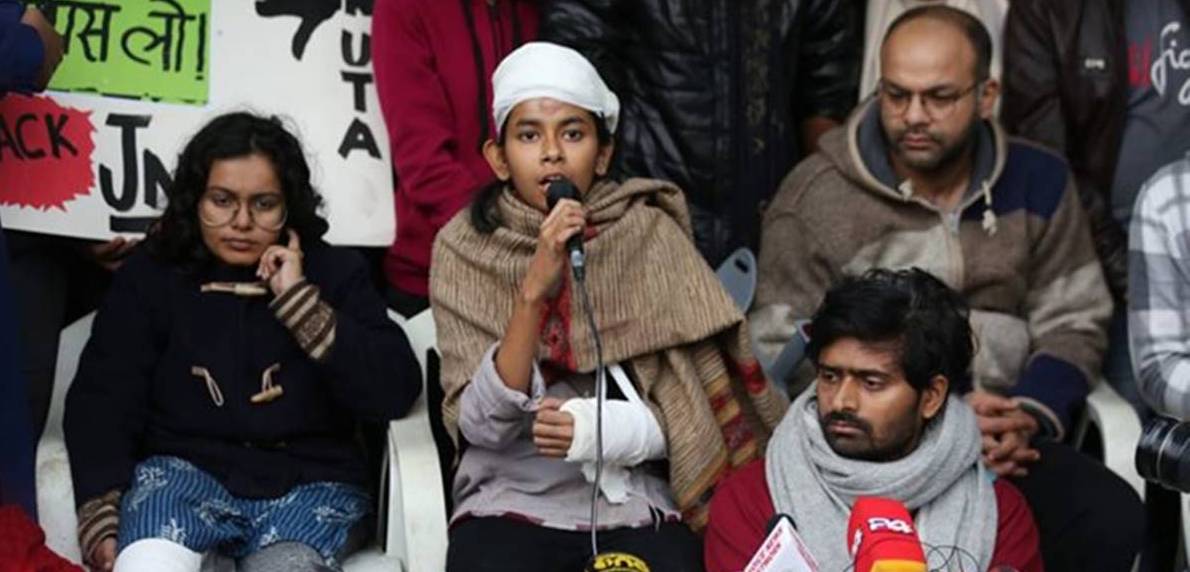
What is the real examination in life? Well, we are used to the kind of exams that schools/colleges/universities conduct; but then, in the complex and curved trajectory of life, we pass through some inexplicable moments when existence takes the most difficult examination. These are the moments when ‘normalcy’ is disturbed, everything is unsettled, and the ‘known’ world begins to look absolutely unfamiliar. Yes, right now I am confronting an exam of this kind.
I love my university; JNU has nurtured me; and I have spent the significant part of my life at this wonderful university. It helped me to evolve as a student; and it made me realize the beauty of the vocation I chose: the joy of being a teacher. My association with this university began in 1979. And then, since 1990 I have been teaching. Apart from its excellent academic culture and beautiful natural landscape, what used to fascinate me was the sense of freedom that we experienced. There was freedom of life-pursuits; there was freedom of ideas and creative explorations; and above all, we were reasonably free from the fear of, say, what happens in the outer word: theft, burglary, lumpenism and violence.
However, things began to change. The iron cage of bureaucracy began to become more powerful than the exploration of creativity; administrators or techno-managers began to suspect the idea of freedom, and as a result, surveillance became the new normal. ‘Order’, ‘administrative efficiency’, ‘documentation’, ‘circulars’ and ‘rules’: these mantras of subjugation began to pollute the environment of the university. And the irony is that despite all these ‘law and order’ machineries, the worst things began to take place at JNU (be it robbery or entry of outside goons) which earlier we could never imagine. And under these circumstances, the other day there was massive burglary at my university residence. The sacred space was violated; the valuables were stolen; and I passed through intense psychic pain.
I felt the fall of an institution—its culture of free movement and trust; I experienced the traumatic death of the ideal I cherished about JNU; and I experienced what it meant to be cheated and betrayed. I taught here for thirty years; and believe me, never did I imagine that something of this kind could happen here. In earlier times when there was no CCTV camera, no 24/7 ‘patrolling’ of the hired security forces, I could visit my home town during the summer vacation without any anxiety. And with absolute pride, I used to tell my loved ones about this place. But then, what a paradox! An ‘efficient’ administration, a ‘tight’ security system, and almost a curfew like situation at the campus during this period of lockdown; yet, it happened…
Love refuses to wither away…
We are humane and vulnerable; and when an incident of this kind happens we begin to doubt ourselves. With deep emotional turmoil and psychic pain, I began to ask a series of questions: Would it ever be possible for me to like the place that was such an integral part of my being for so many years? Or is it that I was naïve; I trusted people; everyone could come to my residence and have a cup of tea with me– be it a professor, a student, a gardener, a plumber or a postman; and I lived simply? Should I now change myself, learn to be ‘cunning’, ‘smart’, ‘diplomatic’; and look at the world with inherent suspicion? Should I alter the very rhythm of my existence?
It was a moment of turmoil. But then, I began to see and experience the ray of light even amid this darkness. Even though I didn’t receive even a formal/courtesy call from the JNU administration, I began to experience the power of love. My friends, my students, my well- wishers: they all came forward. At this moment of crisis, they are helping me in many ways. And it was a wonderful gift; I realized once again that no thief could steal the real diamond—the ethics of care, trust and love. Let me quote from a letter a student (now a faculty at Poona University) wrote to me:
Just got to know about the burglary at your place. I can imagine the shock and loss of things which carry more value than their material value. Like many, I too have been invested emotionally and intellectually in the house in my little way. I wouldn’t say that the ‘transcendental’ is of more significance than the ‘material’ as every material, concrete object in that house is filled with immeasurable memories—the drawing-room floor, the cups which offered tea during our sessions, the garden in the backyard, the space before the front door where we all have chatted before departing…
I can imagine how these concrete objects filled with memories stand violated today. It makes me sad and angry at the same time.
We stand with you in these testing times.
Please take care.
This showering of love heals. And it gives me the confidence to feel that my life has a meaning; and even though at this moment of turmoil when there is a temptation to fall into the trap of despair, cynicism and self-doubt, I begin to renew myself. I would not doubt what I cherished in my life—love and friendship, simplicity and spontaneity, teaching as a spirited communion, and poetry and prayers. And JNU, I begin to feel, is not this bounded geographical space; nor is it a monopoly of the administrators. It has a spirit; and today at this moment of bewilderment I am feeling the warmth of this spirit. My students and my friends are nurturing me.
Is it possible to rob you of your quest?
There is something more that I begin to learn. I ask myself: Should I remain obsessed with my own personal loss, and that too at a time when there is no end to collective suffering: the pandemic, the fear of death, the misery of the downtrodden, the economic and existential crisis, and now the devastating cyclone in Bengal and Odisha? It is in this context that I wish to speak of three reflections.
First, there is no redemption unless we see beyond our solitary islands, and with empathy or mindful listening understand the shared tales of pain, suffering and longing. This relatedness helps us to be free from being neurotically obsessed with our own personal loss. As a collective, we learn to walk together, and heal one another. Sometimes, when I see the pain of migrant workers, or the misery of people devastated by the cyclone, I feel that my loss is insignificant. Well, I do not negate my loss; but then, my salvation, I feel, lies in my ability to expand my horizon, and send my prayers and positive vibrations to all those who are suffering. Yes, the experience of pain brings life to a higher domain. It is transformed into the music of love and compassion. And only then do we realize that chronic mourning or insulation or self-pity is destructive.
Second, I begin to realize the deeper meaning of detachment. No, this is not a life-negating discourse. Instead, this gives us the psychic/spiritual strength to see and accept the eternal recurrence of substance and void, light and darkness, ecstasy and bewilderment, music and noise, and pleasure and pain. This is also the ability to accept that there is no precise/ mathematical ‘order’; there is uncertainty; there are inexplicable tragedies; and everything (our material possessions, our fame or power) is temporal. And hence, our egotistic attachment to our ‘possessions’ is the ultimate cause of pain and suffering. In a way, we ought to be ready to see and accept everything: sunrise and sunset, youthfulness and ageing, visibility and invisibility, prosperity and poverty, and life and death. Possibly, this generates the lightness of being. One becomes a wanderer or a seeker without the burden of egotistic possessions.
Third, it is easy to be ‘positive’ when life is a picnic party. But is it possible not to forget one’s prayers, or deny one’s quest even when things around us are unpleasant? I tend to feel that this is the real examination. Today when I reflect on the burglary at my university residence, or see the rapidly changing statistics of death at the time of the pandemic, or feel the widespread psychic nausea and mental agony, I ask myself: Is it still possible for me to read Tagore’s Gitanjali, feel the beauty and grace of the Himalayan peaks, invoke Jesus and Buddha, trust people spontaneously, and experience the power of love and prayers?
Even if I fail, I do not give up. My quest is my treasure.
Avijit Pathak is Professor of Sociology at JNU .










